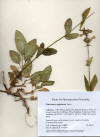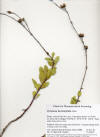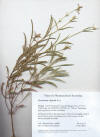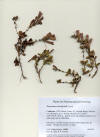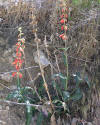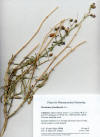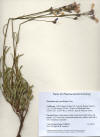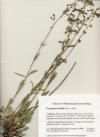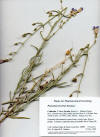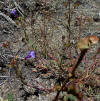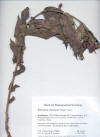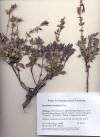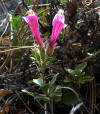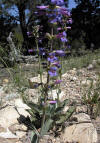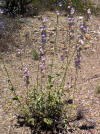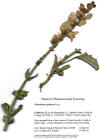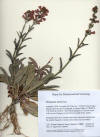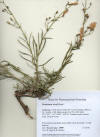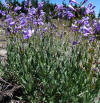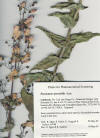|
Penstemon anguineus |
Penstemon anguineus |
Penstemon azureus Klamath NF, Lake-of-the-Island,
Marble Mts. Wilderness, CA
|
|
Penstemon baccharifolius |
Penstemon caesius |
Penstemon caesius |
Penstemon centranthifolius
|
Penstemon cinicola
|
Penstemon davidsonii
|
Penstemon davidsonii
|
Penstemon deustus
|
Penstemon eatonii
|
|
Penstemon floridus
|
Penstemon fruticiformis
|
Penstemon gracilentus
|
|
Penstemon grinnellii |
Penstemon humilus
|
Penstemon grinnellii var.
scrophularioides
|
Penstemon grinnellii var.
grinnellii |
Penstemon heterophyllus
|
Penstemon heterophyllus
|
Penstemon incertus |
|
Penstemon incertus
|
|
Penstemon labrosus
|
Penstemon laetus |
Penstemon monoensis
|
|
Penstemon nemorosus
|
Penstemon newberryi
|
Penstemon newberryi |
Penstemon newberryi
|
Penstemon pachyphyllus |
Penstemon palmeri
|
|
Penstemon palmeri
|
Penstemon parryi
|
Penstemon parryi
|
Penstemon procerus Oregon—Cascade Region. Willamette NF: between Santiam Pass and junction of Hwy 22 and Hwy 20, Lost Lake, north side of Hwy 20; 44º25'48.2", 121º54’46.7”, 1213 m. Lodgepole pine forest. SPJ-16426, 15 Aug 2008
|
Penstemon roezlii
|
Penstemon rostriflorus |
|
Penstemon
rostriflorus |
Penstemon
rostriflorus
|
|
|
Penstemon speciosus Oregon. Blue Mountains. Wallowa NF, south of Lick Creek, elev. 6,000 ft., 29 July 2011 |
Penstemon spectabilis
|
Penstemon spectabilis
|
|
Trees and Shrubs of Kern County (Nov 2012, July 2016) Penstemon (Chelonaceae). Perennial herbs, subshrubs, or shrubs; leaves usually opposite, upper sometimes alternate; flowers of united tubular petals (corolla), forming a cylindrical to inflated tube, similar to the throat of a bull frog, with three lower and two upper short lobes, the lobes spreading to erect; fertile stamens 4, inserted at two levels in pairs; staminode bearded or not; capsule similar to that of Keckiella. ±271 species concentrated in western North America, south to Guatemala. Key to Penstemon shrubs and subshrubs 1. Flowers red to rose or pink..................................................................................... 2 1. Flowers blue to lavender........................................................................................ 5
2. Low matted shrubs
on rocks, usually granite; leaves 2. Plants erect; leaves sword-shaped; flowers red...................................................... 3
3. Leaves wider near
base, clasping the stem; corolla trumpet shaped,
3. Leaves relatively
narrow throughout, or narrowed to base, not
4. Leaves green or
yellow green; corolla glandular; mature anthers
4. Leaves glaucous;
corolla smooth; mature anthers shaped like a pair of
5. Leaf blades near
base of plant elliptical to round,1–3× longer
5. Leaf blades
strap-shaped to boat-shaped, >3× longer than wide, with short
6. Leaf blades broad
elliptic to round, abruptly narrowed to petiole 6. Leaves blades longer than wide, gradually narrowed to petiole. Penstemon laetus
7. Lower stem leaves
with broad slightly ±elliptic blades, toothed along ...... 6a. Corolla 22–30 mm, whitish lavender to pink.. .......................... var. grinnellii ...... 6a. Corolla larger, 26–35 mm, blue-violet........................... var. scrophularioides
7. Lower stem leaves
with relatively narrow blades, usually narrower below
8. Flowers-fruits
reflexed on erect-straight pedicels; corolla grandually
...... 7a. Stems bald, except near
base............................................. var.
heterophyllus
8. Flowers-fruits
erect to slightly reflexed on ascending or curved
9. Corolla without red lines.............................. ........................... Penstemon incertus 9. Corolla with red lines, especially lower lobes.......... ........ Penstemon fruticiformis ...... Corolla externally glandular......................................................... var. amargosae ...... Corolla externally lacking glands or hairs................................ var. fruticiformis Penstemon caesius A. Gray 1883. Plants with woody leafy stems, loosely branched near ground, mat-like, with erect flowering stems < 1 m high; leaves spoon-shaped on petioles about the same length as blades, 1.5–4.3 cm, whitish green or glaucous, curved upwards lengthwise along the mid region, reduced on flowering stems; flowers Jun–Aug, lavender, slightly inflated and tubular, nodding from straight spreading to curved pedicel-like branches (peduncles), with short bract-like leaves at base of shorter pedicels, appearing solitary on a peduncle but often accompanied by a less developed flower; anthers dehiscent about half-way from base, with prominent short teeth along suture, without hairs. Rocky ridges and slopes in subalpine open coniferous forests, 6,000–11,000 ft; Southern Sierra Nevada and San Bernardino Mts. Type from San Bernardino Mts., CA. Kern Co.: “A characteristic plant of rocky places at high elevations in the yellow pine and red fir forests”, “Sunday Peak and Black Mountain the Greenhorn Range and on the rocky southwestern rim of the Kern Plateau” (Twisselmann), 2,000–2,468 m (CCH). Penstemon centranthifolius Bentham 1835. Scarlet bugler. Stems woody mostly near root, solitary, or numerous and bunched together near base, erect, mostly simple, leafy about half of their length, glaucous, to 1.5 m high; leaves conspicuously glaucous, larger in the mid region of stems, sword-shaped, 4–10× longer than wide, 4–10 cm long, clasping the stem; flowers Apr–Jul, scarlet, on erect pedicels arising from simple (undivided) scapes (inflorescence raceme) with reduced leaves, nodding ±in the same direction, corolla long tubular, with short erect to slightly spreading lobes, 2–3 cm long, anthers dehiscing fully, without hairs. Disturbed places, chaparral or oak woodland below 6,000 ft; Coast Ranges from Lake Co to San Diego Co, Sierra Nevada to southwestern edge of the Mojave Desert, and Baja California. Type from “Nova, California.” Kern Co.: “Occasional in the Upper Sonoran shrubby associations from the Temblor Range southeast to Ft. Tejon” (Twisselmann), 914–1,524 m (CCH). Penstemon fruticiformis Coville 1893. Desert mountain penstemon. Rounded bush with numerous erect closely compacted stems, 0.5–1.5 m; stems pale green-to bluish green (glaucous) without hairs, leafy to flowering scapes; leaves generally blade-like, nearly uniform in width, slightly wider near base, 4–10× longer than wide, 2.5–6.5 cm, slightly clasping stems, gradually reduced up the stem, curled upwards lengthwise and often bending downwards; flowers Apr–Jun, whitish blue to rose or lavender, on ascending or curved pedicels in unequal pairs—one on a shorter pedicel than the other, peduncles and pedicels mostly without hairs, or in var. amargosae short gland tipped hairs developing along one side in a line; corolla without hairs, or with scattered short gland-tipped hairs in var. amargosae; anthers dehiscing fully; staminode extending beyond the anthers to the lower corolla lobes, like a tooth-brush—with stiff erect white hairs. Creosote scrub to pinyon-juniper woodland, 1,000–8,000 ft, northern Mojave Desert mountains and western southern Sierra Nevada, California and western Nevada. Type from Wild Rose Canyon, Panamint Mts., Inyo Co., CA; var. amargosae Keck 1917, type from Amargosa Desert, Nye Co., NV. Kern Co.: Western border of Mojave Desert, Southern Sierra Nevada, east of Walker Pass, L. D. Benson,10 May 1947 (CCH–NY); Spjut, 10 Apr 2003 (BRIT, US); Tehachapi Mts, northern Antelope Valley, O. & C. Mistretta, 10 May 2010 (CCH-RSA), between Willow Springs and Tehachapi, Abrams & McGregor, 25 Jun 1908 (CCH-A). Penstemon grinnellii Eastwood 1905 var. grinnellii. Grinnell’s Penstemon. Rounded bush, woody at base; leafy stems bald, creeping, branching and ascending to 40 cm from which numerous erect terminal flowering stems extend the plant further in height to 1 m or more; leaves green, elliptical to wider below mid region, boat-shaped—curved upwards lengthwise along mid region and arched downwards towards tip (recurved), 3–5× longer than wide, 5–9 cm long, narrowed to short petiole, or blade attached to stem without clasping, toothed along margins; flowers May–Aug, pinkish white or pale lavender, the tube and throat inflated like a bull-frog; flower scapes (rachis of inflorescence) glandular, with slender ascending lateral branchlets bearing 4–5 flowers each on erect pedicels, or flowers mostly in pairs, with one ascending and the other erect; anthers dehiscing fully; staminode curved and exserted with crested yellowish orange or white hairs spreading in various directions. Chaparral, foothill and pinyon/juniper woodland, montane forest, 1,000–8,000 ft; Southern Sierra Nevada to Peninsular Ranges. Type from Mt. Wilson. Kern Co.: CCH—Trail to Owens Peak, near creek,2,000 m (Fraga & Griffith, 26 Jun 2003, RSA), Bodfish (Jepson, 6 May 1940, JEPS), Scodie Canyon, 26 Apr 2014, Gardner & Poutasse, RSA). Penstemon grinnellii var. scrophularioides (P. scrophularioides M.E. Jones 1908) N.H. Holmgren 1992. Reportedly larger than the typical variety with blue violet instead of pinkish flowers. Chaparral, foothill and pinyon/juniper woodland, montane forest; 1,600–9,000 ft. Santa Clara Co. south along the Coast Ranges across the Transverse Ranges, north to southern Sierra Nevada. Type from Keane [Kern Co.], CA. Kern Co.: “Occasional in the arid Upper Sonoran associations from Ballinger Canyon in the Mt. Abel region northeast though the mountains canyons to Inyo County” (Twisselmann); Greenhorn Range, Breckenridge to Tehachapi Mt., Temblor Range, Mt. Pinos, 510–2,210 m (CCH). Penstemon heterophyllus Lindley 1836. var. heterophyllus. Chaparral penstemon. Rounded bush to 1.5 m; woody near base; stems leafy, ascending to erect, green or glaucous; leaves green, often in axillary clusters, narrow and strap-like, often >10× longer than wide, 2–9 cm long, usually more gradually narrowed to base than apex, not clasping; flowers Apr–July, blue to lavender, shortly narrow-tubular and inflated above like a wine-glass; on straight erect pedicels without peduncles (racemose), often appressed to the bald flowering stems; anthers opening up to 2/3; staminode curved and beardless. Foothill woodland, chaparral, “yellow pine forest” below 5,500 ft. Type from California without specific location. Kern Co.: “Occasional in the chaparral and Douglas oak woodland in the Temblor Range” (Twisselmann, not distinguished to variety), San Emigdio Range. Pine Mt., Black Bob Canyon, 914–1,982 m (CCH, distinguished only to species). Var. australis Munz & I.M. Johnston 1932 (Tehachapi Mts. D. Howe, Jun 1932, CCH; type from Claremont). Penstemon incertus Brandegee 1899. Mojave Penstemon. Rounded bush to 1 (-2) m high and in diam; woody stems several or more, dichotomously branched one or more times; leafy stems on new season growth; young stems glaucous; leaves glaucous, narrow strap-like or narrow sword-shaped, 5–10× longer than wide, 4–7 cm long, usually more gradually narrowed to apex than base, not clasping, reduced up the stem; flowers May–Jun, blue to violet or purple, shortly broad-tubular and inflated above like a bull frog, on wide spreading peduncles with upcurved pedicels and leaf-like bracts at base, solitary or in pairs; anthers dehiscing fully; staminode curved and bearded. Gravel slopes and flats, Joshua tree woodland and sagebrush scrub, 3,000–5,500 ft; Southern Sierra Nevada and Mojave Desert, south to Peninsular Ranges. Type from Walker Pass [Kern Co.]. Kern Co.: “Common in the Walker Pass region, west in South Fork Valley to Onyx; scarce on Breckenridge Mountains, along the edge of Indian Wells Valley, and in the desert canyons south to Pine Tree Canyon” (Twisselmann), 746–1,950 m (CCH). Penstemon labrosus [P. barbatus (Chelone barbata Cavinlles 1795) var. labrosus A. Gray 1876] Masters ex Hooker f. 1884. Plants with one to numerous erect mostly simple herbaceous stems bunched together at base to 70 cm high, leafy to inflorescence, woody mostly near root; stems and leaves glaucous, leaves narrowly elliptic to wider above mid region, narrowly elliptic on upper stems, 12–20× longer than wide, 3–9 cm long, more gradually narrowed to stem than to apex; flowers Jun–Aug, red to orange, nodding often > 90° on erect to wide spreading pedicels, in interrupted tight clusters along undivided floral scapes; corolla long tubular, not inflated, shaped like a dolphin, with the lower lobes strongly reflex and recurved, upper lobes erect—aligned with corolla tube, 3.2–4.0 cm long, anthers dehiscing distally 2/3, without hairs; staminode not bearded. Openings in coniferous forests, 4,000–10,000 ft; mountains of southern California to Baja California. Type from Mt. Pinos, CA. Kern Co.: Common and showy along road banks in the forest regions of Mt Pinos, 1,829–2,679 m (CCH). One collectin in CCH reported from along the Pacific Crest Trail, on the east side of Mount Jenkins (Fraga & De Groot, 8 Aug 2003), is questionable based on its occurrence outside the more southern range of the species. May be confused with Penstemon rostriflorus, which has similar flowers but notably differs by the pant-like anthers dehising proximally. Penstemon laetus A. Gray 1859 var. laetus. Gay Penstemon Perennial herb to short woody near base with leafy ascending stems and longer erect flowering stems, to 0.75 m high; leaves green, often in fascicles on lower stems, spoon-shaped to boat-shaped, usually more gradually narrowed to base than apex on the lower part of the plant, 1.5–10 cm long; flowers May–Jul, blue to lavender, often more reddish on the tube and blue on the lobes, shortly tubular and inflated above; nodding from straight spreading pedicels; anthers opening from base to 4/5; staminode straight, beardless. Foothill woodland, chaparral, “yellow pine forest” below 5,500 ft. Type from Fort Tejon and vicinity. Kern Co.: “Occasional on rocky slopes in all associations in the mountains” (Twisselmann), 457–1,828 m (CCH). Penstemon newberryi A. Gray 1857 var. newberryi. Pride-of-the-Mountain. Low ±matted shrubs or subshrubs, ±rounded in outline to 0.4 m or more diam with creeping woody leafy stems, loosely branched near ground, with erect flowering stems to 0.4 m high; leaves not closely overlapping. not in whorl-like arrangements as in P. davidsonii, spoon-shaped to broad elliptical or wider below mid region, 1–2× longer than wide, 1–4 cm, on short petioles ~1/4 length of blade, dark green, slightly cupped or folded upwards lengthwise along midrib, reduced on flowering stems, finely toothed along margins; flowers Jun–Aug, rose red, tubular and slightly inflated, 20–30 mm, ±all nodding in the same direction (“subsecund”) on straight spreading short pedicels in a short linear array (raceme, 10–20 cm or more); anthers exserted, fully dehiscent, covered with woolly hairs; staminode shorter than stamens, bearded. Talus and rock terraces, 5,000–11,000 ft. from Mt. Shasta, western Nevada to Tehachapi. Type collected near Mt. Lassen. Mountain pride patches recognized in MCV2 when “characteristically scattered with other small herbs such as Streptanthus tortuosus in the subshrub or herbaceous layers; other small shrub and trees <2% in absolute cover.” Kern Co.: “Colonies grow at the summit of Sunday Peak and on the north slopes of Basket Peak in the Greenhorn Range, around the granite blocks along the southern rim of the Kern plateau, and at Lookout Point in the Piute Mountains” (Twisselmann). 1,554–2,561 m (CCH). Two other varieties found in northern California to Oregon. Penstemon rostriflorus Kellogg 1860 [Includes Penstemon bridgesii A. Gray 1868; Penstemon bridgesii var. rostriflorus (Kellogg) Schelle 1903]. Stem , woody mostly near root, solitary. or numerous and bunched together at base, erect, mostly simple to 1.0 m, leafy ~1/4 of the length, yellowish green; leaves narrowly elliptic to wider above mid region, narrowly sword-shaped on upper stems, 8–12× longer than wide, 2–7 cm long, more gradually narrowed to stem than to apex; flowers Jun–Aug, red to orange, nodding often > 90° on erect to wide spreading pedicels, in interrupted tight clusters along undivided floral scapes, lower portion with 2–5 flowers, singles near apex, often developing ± within a directional span of 60°; corolla long tubular, not inflated, shaped like a dolphin, with the lower lobes strongly reflex and recurved, upper lobes erect—aligned with corolla tube, 2.2–3.3 cm long, anthers dehiscing basally 1/4–1/3, without hairs; staminode not bearded. Sagebrush, pinyon-juniper, Gambel oak, ponderosa pine and mountain mahogany communities, 1,650–11,000 ft; Colorado to northwestern New Mexico west to mountains of southern California. Type from crevice of lower Dome at the back of the Great Tissaac, or South–3,500 ft above Yosemite Valley, Mariposa Co., CA. Kern Co.: Common and showy in the red fir forest and the higher elevations of the yellow pine forest, often growing around exposed summit rock outcrops” (Twisselmann), 1,584–2,457 m (CCH).
|
||
|
General references on Pharmalogical Activity in Penstemon Wysokinska H. and Z. Skrzypek. 1992. Studies on iridoids of tissue cultures of Penstemon serrulatus: isolation and their antiproliferative properties. J. Nat. Prod. 55(1): 58–63. Abstract— Penstemide and serrulatoloside as well as penstemide aglycone and serrulatoloside aglycone were isolated and identified in the calli and suspension cultures of Penstemon serrulatus. The influence of serrulatoloside, penstemide, and its aglycone on the spontaneous proliferation of mouse spleen lymphocytes or hepatoma cells in the Syrian hamster has been estimated in vitro. It has been found that these compounds produce a dose-dependent inhibition of [3H]-thymidine incorporation into the DNA of the examined cells. Zhou B. N., B. D. Bahler, G. A. Hofmann, R. Mattern, R. K. Johnson and D. G. Kingston. 1998. Phenylethanoid glycosides from Digitalis purpurea and Penstemon linarioides with PKCalpha-inhibitory activity. J Nat Prod. 61: 1410–1412. “In a continuation of our search for potential tumor inhibitors from plants, it was found that the CH2Cl2-MeOH (1:1) extracts from Digitalis purpurea and Penstemon linarioides both showed PKCalpha-inhibitory bioactivity. Bioassay-directed fractionation of the extract from D. purpurea yielded the new, weakly active phenylethanoid glycoside 2-(3-hydroxy-4-methoxy-phenyl)-ethyl-O-(alpha-L-rhamnosyl)-(1-->3) -O- (alpha-L-rhamnosyl)-(1-->6)-4-O-E-feruloyl-beta-D-glucopy ran oside (1) together with the four known compounds calceolarioside A (2), calceolarioside B (3), forsythiaside (4), and plantainoside D (5). The extract from P. linarioides yielded the three known glycosides leucosceptoside A (6), acteoside (7), and poliumoside (8), together with the iridoid plantarenaloside (9). All of the isolated compounds, except compound 9, showed inhibitory activity against PKCalpha with IC50 values (in microM) of 125 (1), 0.6 (2), 4.6 (3), 1.9 (4), 14.8 (5), 19.0 (6), 9.3 (7), and 24.4 (8).”
|
||


